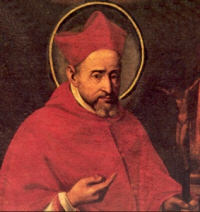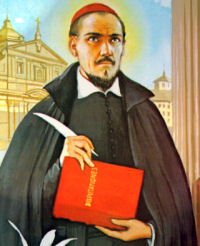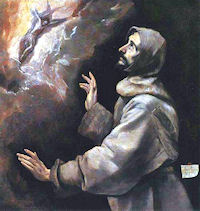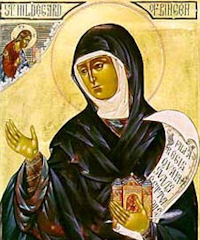September 17, 2013
Tuesday of the Twenty-fourth Week in Ordinary Time
Beloved, this saying is trustworthy:
whoever aspires to the office of bishop desires a noble task.
Therefore, a bishop must be irreproachable,
married only once, temperate, self-controlled,
decent, hospitable, able to teach,
not a drunkard, not aggressive, but gentle,
not contentious, not a lover of money.
He must manage his own household well,
keeping his children under control with perfect dignity;
for if a man does not know how to manage his own household,
how can he take care of the Church of God?
He should not be a recent convert,
so that he may not become conceited
and thus incur the Devil’s punishment.
He must also have a good reputation among outsiders,
so that he may not fall into disgrace, the Devil’s trap.
Similarly, deacons must be dignified, not deceitful,
not addicted to drink, not greedy for sordid gain,
holding fast to the mystery of the faith with a clear conscience.
Moreover, they should be tested first;
then, if there is nothing against them,
let them serve as deacons.
Women, similarly, should be dignified, not slanderers,
but temperate and faithful in everything.
Deacons may be married only once
and must manage their children and their households well.
Thus those who serve well as deacons gain good standing
and much confidence in their faith in Christ Jesus.
R. (2) I will walk with blameless heart.
Of mercy and judgment I will sing;
to you, O LORD, I will sing praise.
I will persevere in the way of integrity;
when will you come to me?
R. I will walk with blameless heart.
I will walk with blameless heart,
within my house;
I will not set before my eyes
any base thing.
R. I will walk with blameless heart.
Whoever slanders his neighbor in secret,
him will I destroy.
The man of haughty eyes and puffed up heart
I will not endure.
R. I will walk with blameless heart.
My eyes are upon the faithful of the land,
that they may dwell with me.
He who walks in the way of integrity
shall be in my service.
R. I will walk with blameless heart.
Jesus journeyed to a city called Nain,
and his disciples and a large crowd accompanied him.
As he drew near to the gate of the city,
a man who had died was being carried out,
the only son of his mother, and she was a widow.
A large crowd from the city was with her.
When the Lord saw her,
he was moved with pity for her and said to her,
“Do not weep.”
He stepped forward and touched the coffin;
at this the bearers halted,
and he said, “Young man, I tell you, arise!”
The dead man sat up and began to speak,
and Jesus gave him to his mother.
Fear seized them all, and they glorified God, exclaiming,
“A great prophet has arisen in our midst,”
and “God has visited his people.”
This report about him spread through the whole of Judea
and in all the surrounding region.
Catholic Culture

Collect: O God, who adorned the Bishop Saint Robert Bellarmine with wonderful learning and virtue to vindicate the faith of your Church, grant, through his intercession, that in the integrity of that same faith your people may always find joy. Through our Lord Jesus Christ, your Son, who lives and reigns with you in the unity of the Holy Spirit, one God, for ever and ever.
o Confectioners' Sugar Icing
o Hot Cross Buns I
o Quick Hot Cross Buns
o Cross of Victory
o Triumph of the Cross
o Roman Ritual Blessing Before and After Meals: Ordinary Time (2nd Plan)
o Prayer to St. Robert Bellarmine
o Francis Embodies the Christological Truth at the Root of Human Existence | Pope Benedict XVI
o Francis: Enamoured of Christ and an Architect of Peace | Pope Benedict XVI
o Franciscan Symbolism | Sister M. Michaeline O.S.F.
o Homily on St. Francis of Assisi (09-17-1993) | Pope John Paul II
o Saint Francis of Assisi | Pope Benedict XVI
Ordinary Time: September 17th
Optional Memorial of St. Robert Bellarmine, bishop and doctor
Old Calendar: Impression of the Stigmata of St. Francis; St. Hildegarde. abbess (Hist)
St. Robert Bellarmine (1542-1621) was born in Montepulciano, Italy, and died in Rome. The son of noble parents, he entered the Society of Jesus, finishing his theological studies at Louvain, Belgium. His services to the Church were outstanding and many. He occupied the chair of controversial theology in Rome. He defended the Holy See against anti-clericals. He wrote books against the prevailing heresies of the day. His catechism, translated into many languages, spread the knowledge of Christian doctrine to all parts of the world. He was the Counsellor of Popes and spiritual director of St. Aloysius Gonzaga. He helped St. Francis de Sales obtain approval of the Visitation Order. As a religious he was a model of purity, humility and obedience; as a bishop and Cardinal, an example of great love for his flock.
According to the 1962 Missal of Bl. John XXIII the Extraordinary Form of the Roman Rite, today is the feast of the Commemoratioin of the Imprinting of the Holy Stigmata on the Body of St. Francis and St. Robert Bellarmine's feast is celebrated on May 13. Two years before his death St. Francis retired to Mt. Alverno where he began a forty days' fast in honor of St. Michael the Archangel. There, while in a state of continual prayer and unceasing watching, he saw in a vision a seraph with burning, dazzling wings whose feet and hands were nailed to a cross; at the same time five wounds, like those of our Lord, appeared on Francis' feet, hands and side; from the wound in his side blood flowed. These stigmata were so fully verified subsequently that the Franciscans since the fourteenth century have celebrated a feast in honor of the event.
St. Robert Bellarmine

He was born at Montepulciano in Tuscany on October 4, 1542, the feast of the Poverello of Assisi toward whom he always cherished a special devotion. The day on which he died, September 17, is now the feast in honor of the stigmata of St. Francis.
In 1560 Robert Bellarmine entered the Society of Jesus. He easily ranks among its greatest men, illustrious for learning as well as for piety, humility, and simplicity of heart. If it were possible to summarize his life in a single sentence, one that would resolve all the varied activities and accomplishments of his long career, a verse from the psalm might serve: "If I forget you, Jerusalem, may my right hand be forgotten." His most important work was controversial in nature but the impact of his presentation "resembled the final chord in a mighty cantata, a chord that resounded through all the vice and scandal resulting from the internal corruption of the Church of that day, and that chord heralded Mother Church as one, holy, and Catholic" (E. Birminghaus).
Bellarmine also acted as confessor to the youthful Aloysius and John Berchmans. It might be asked why three hundred years passed before the beatification and canonization of Bellarmine. Long ago Bishop Hefele pointed to the reason when he wrote: "Bellarmine deserves the highest degree of respect from Catholics, even though he has not been canonized. Those who labored to besmirch him have only erected a monument of shame for themselves!" Finally in 1923, he was beatified; canonization followed in 1930, and on September 17, 1931, Pope Pius XI declared him a doctor of the Church.
Excerpted from The Church's Year of Grace, Pius Parsch
Patron: canon lawyers; canonists; catechists; catechumens; archdiocese of Cincinnati, Ohio.
Symbols: red hat of cardinal; book denoting doctor of the Church; pictured in the red garments of a Cardinal.
Things to Do:
Stigmata of St. Francis

Saint Bonaventure, biographer of Saint Francis of Assisi, wrote that two years before his holy death he had been praying on Mount Alverno in a solitary retreat, where he had gone to fast for forty days in honor of the Archangel Michael. No one ever meditated more than Francis on the Passion of his Lord. During his retreat he beheld in vision a six-winged Seraph attached to a cross, and received at the same time a painful wound of the heart, which seemed to transpierce it. When the vision ended his own hands and feet bore the marks of the angelic crucifixion which he had seen in the vision. He understood by his vision that the soul must come to resemble Christ by the ardors of its interior fire, rather than by any physical, exterior means. We reproduce here a meditation of the saintly 19th century Abbot, Dom Guéranger of Solemnes in France
The Feast of the Stigmata of Saint Francis, whom we will soon honor again on his feast of October 4th, is not only to glorify a Saint; it commemorates and signifies something which goes beyond the life of any single man, even one of the greatest of the Church. The God-Man never ceases to live on in His Church, and the reproduction of His own mysteries in this Spouse whom He wants to be similar to Himself, is the explanation of history.
In the thirteenth century it seemed that charity, whose divine precept many no longer heeded, concentrated in a few souls the fires which had once sufficed to inflame multitudes. Sanctity shone as brilliantly as ever, but the hour for the cooling of the brazier had struck for the peoples. The Church itself says so today in its liturgy, at the Collect: ‘Lord Jesus Christ, when the world was growing cold, You reproduced the sacred marks of Your passion in the body of the most blessed Francis, in order that Your love might also set our hearts afire.’ The Spouse of Christ had already begun to experience the long series of social defections among the nations, with their denials, treasons, derision, slaps, spittings in the very praetorium, all of which conclude in the legalized separation of society from its Author. The era of the Passion is advanced; the exaltation of the Holy Cross, which for centuries was triumphant in the eyes of the nations, acquires in the sight of heaven, as the Angels look down upon it, the aspect of an ever closer resemblance with the Spouse to the sufferings of her crucified Beloved.
Saint Francis, loved today by all who know of him — and few there are who do not — was like precious marble placed before an expert sculptor. The Holy Spirit chose the flesh of the seraph of Assisi to express His divine thought, thus manifesting to the world the very specific direction He intends to give to souls thereafter. This stigmatization offers a first example, a complete image, of the new labor the divine Spirit is meditating — total union, on the very Cross of Christ itself, of the mystical Body with the divine Head. Francis is the one honored by this primacy of choice; but after him the sacred sign will be received by others, who also personify the Church. From this time on, the Stigmata of the Lord Jesus will be at all times visible, here and there on this earth.
—Excerpted from L’Année liturgique, by Dom Prosper Guéranger (Mame et Fils: Tours, 1919), “The Time after Pentecost V”, Vol. 14, translation O.D.M.
Things to Do:
St. Hildegarde

Called the "Sibyl of the Rhine," Hildegard of Bingen became the most famous mystic and prophet of her time. Her writings and music are still found in all major bookstores, and no woman saint is more popular in her native Germany. When she was eight, she was placed in a convent, where she later became abbess. She was a biblical exegete, visionary, preacher, composer, and herbalist, who corresponded with the major royalty and church leaders of her day, including four popes. Her greatest vision came when she was forty-two, which is recorded in her famous Scrivias, or Know the Ways of the Lord, a treatise whose magnificence rivals William Blake's visionary work. Hildegard's spiritual writings found approval during her lifetime, and her lectures on the spiritual life drew crowds from all over Europe. She wrote prolifically, on topics as varied as history and drama, polictics and and liturgical poetry. Her monastery joyfully sang the praises she wrote. During the last year of her life, when she was eighty-one, she entered into a conflict with ecclesiastical authorities because she allowed a young man who had been excommunicated to be buried in her abbey cemetery, and her convent was placed under interdict. It is probably that, for this reason, Hildegard was never formally canonized, although she is found in all major saints' books and her cult was approved locally because of so many miracles reported at her tomb.
— Excerpted from Women Saints, Madonna Sophia Compton
Things to Do:
11. And it came to pass the day after, that he went into a city called Nain; and many of his disciples went with him, and much people.
12. Now when he came nigh to the gate of the city, behold, there was a dead man carried out, the only son of his mother, and she was a widow: and much people of the city was with her.
13. And when the Lord saw her, he had compassion on her, and said to her, Weep not.
14. And he came and touched the boy: and they that bore him stood still. And he said, Young man, I say to you, Arise.
15. And he that was dead sat up, and began to speak. And he delivered him to his mother.
16. And there came a fear on all: and they glorified God, saying, That a great prophet is risen up among us; and, That God has visited his people.
17. And this rumor of him went forth throughout all Judea, and throughout all the region round about.
CYRIL; The Lord joins one miracle upon another. In the former instance He came indeed when called for, but in this He came self-invited; as it is said, And it came to pass the day after that he went into a city called Nain.
THEOPHYL; Nain is a city of Galilee, within two miles of mount Tabor. But by the divine counsel there were large multitudes accompanying the Lord, that there might be many witnesses of so great a miracle. Hence it follows, And his disciples went with him, and much people.
GREG. NYSS. Now the proof of the resurrection we learn not so much from the words as from the works of our Savior, who, beginning His miracles with the less wonderful, reconciled our faith to far greater. First indeed in the grievous sickness of the centurion's servant, He verged upon the power of resurrection; afterwards with a higher power he led men to the belief in a resurrection, when He raised the widow's son, who was carried out to be buried; as it is said, Now when he came nigh to the gate of the city, behold, there was a dead man carried out, the only son of his mother.
TITUS BOST. But some one will say of the centurion's servant, that he was not going to die. That such an one might restrain his rash tongue, the Evangelist explains that the young man whom Christ came upon was already dead, the only son of a widow. For it follows, And she was a widow, and much people of the city was with her.
GREG. NYSS. He has told us the sum of misery in a few words. The mother was a widow, and had no further hope of baring children, she had no one upon whom she might look in the place of him that was dead. To him alone she had given suck, he alone made her home cheerful. All that is sweet and precious to a mother, was he alone to her.
CYRIL; These were sufferings to excite compassion, and which might well affect to mourning and tears, as it follows, And when the Lord saw her, he had compassion on her, saying, Weep not.
THEOPHYL; As if He said, Cease to weep for one as dead, whom you shall soon see rise again alive.
CHRYS. But when He bids us cease from weeping Who consoles the sorrowful, He tells us to receive consolation from those who are now dead, hoping for their resurrection. But life meeting death stops the bier, as it follows, And he came.
CYRIL; He performs the miracle not only in word, but also touches the bier, to the end that you might know that the sacred body of Christ is powerful to the saving of man. For it is the body of Life and the flesh of the Omnipotent Word, whose power it possesses. For as iron applied to fire does the work of fire, so the flesh, when it is united to the Word, which quickens all things, becomes itself also quickening, and the banisher of death.
TITUS BOST. But the Savior is not like to Elias mourning over the son of the widow of Sarepta, nor as Elisha who laid his own body upon the body of the dead, nor as Peter who prayed for Tabitha, but is none other than He who calls those things which be not, as though they were, who can speak to the dead as to the living, as it follows, And he said, Young man.
GREG. NYSS. When He said, Young man, He signified that he was in the flower of his age, just ripening into manhood, who but a little while before was the sight of his mothers eyes, just entering upon the time of marriage, the scion of her race, the branch of succession, the staff of her old age.
TITUS BOST. But straightway he arose to whom the command was made. For the Divine power is irresistible; there is no delay, no urgency of prayer, as it follows, And he that was dead sat up and began to speak, and he gave him to his mother. These are the signs of a true resurrection, for the lifeless body cannot speak, nor would the mother have carried back to her house her dead and lifeless son.
THEOPHYL; But well does the Evangelist testify that the Lord is first moved with compassion for the mother, and then raises her son, that in the one case He might set before us for our imitation an example of piety, in the other He might build up our belief in His wonderful power. Hence it follows, And there came a fear upon all, and they glorified God, &c.
CYRIL; This was a great thing in an insensible and ungrateful people. For in a short time afterward they would neither esteem Him as a prophet, nor allow that He did aught for the public good. But none of those that dwelt in Judea were ignorant of this miracle, as it follows, And this rumor of him went forth throughout all Judea.
MAXIM. But it is worthy of remark, that seven resurrections are related before our Lord's, of which the first was that of the son of the widow of Sarepta, the second of the Shunamite's son, the third which was caused by the remains of Elisha, the fourth which took place at Nain, as is here related, the fifth of the ruler of the Synagogue's daughter, the sixth of Lazarus, the seventh at Christ's passion, for many bodies of the saints arose. The eighth is that of Christ, who being free from death remained beyond for a sign that the general resurrection which is to come in the eighth age shall not be dissolved by death, but shall abide never to pass away.
THEOPHYL; But the dead man who was carried without the gate of the city in the sight of many' signifies a man rendered senseless by the deadening power of mortal sin, and no longer concealing his soul's death within the folds of his heart, but proclaiming it to the knowledge of the world, through the evidence of words or deeds as through the gate of the city. For the gate of the city, I suppose, is some one of the bodily senses. And he is well said to be the only son of his mother, for there is one mother composed of many individuals, the Church, but every soul that remembers that it is redeemed by the death of the Lord, knows the Church to be a widow.
AMBROSE; For this widow surrounded by a great multitude of people seems to be more than the woman who was thought worthy by her tears to obtain the resurrection of her only son, because the Church recalls the younger people from the funeral procession to life by the contemplation of her tears, who is forbid to weep for him to whom resurrection was promised.
THEOPHYL; Or the dogma of Novatus is crushed who ho endeavoring to do away with the purifying of the penitent, denies that the mother Church, weeping for tile spiritual extinction of her sons, ought to be consoled by tile hope of their restoration to life.
AMBROSE; This dead man was borne on the bier by the four material elements to the grave, but there was a hope of his rising again because he was borne on wood, which though before it did not benefit us, yet after Christ had touched it, began to profit to life, that it might be a sign that salvation was to be extended to the people by the wood of the cross. For we lie lifeless on the bier when either the fire of immoderate desire bursts forth, or the cold moisture breaks out, and through the sluggish state of our earthly body the vigor of our minds waxes dull.
THEOPHYL; Or the coffin on which the dead is carried is the ill at ease conscience of a desperate sinner. But they who carry him to be buried are either unclean desires, or the allurements of companions, who stood when our Lord touched the bier, because the conscience, when touched by dread of the judgment from on high, often checking its carnal lusts, and those who unjustly praise, returns to itself, and answers its Savior's call to life.
AMBROSE; If then your sin is so heavy that by your penitential tears you can not yourself wash it out, let the mother Church weep for you, the multitude standing by; soon shall you rise from the dead and begin to spear; the words of life; they all shall fear, (for by the example of one all are corrected;) they shall also praise God who has given us such great remedies for escaping death.
THEOPHYL; But God has visited His people not only by the one incarnation of His Word, but by ever sending It into our hearts.
THEOPHYL. By the widow also you may understand a soul that has lost her husband in the divine word. Her son is the understanding, which is carried out beyond the city of the living. Its coffin is the body, which some indeed have called the tomb. But the Lord touching him raises him up, causing him to become young, and rising from sin he begins to speak and teach others. For before he would not have been believed.
Catena Aurea Luke 7







